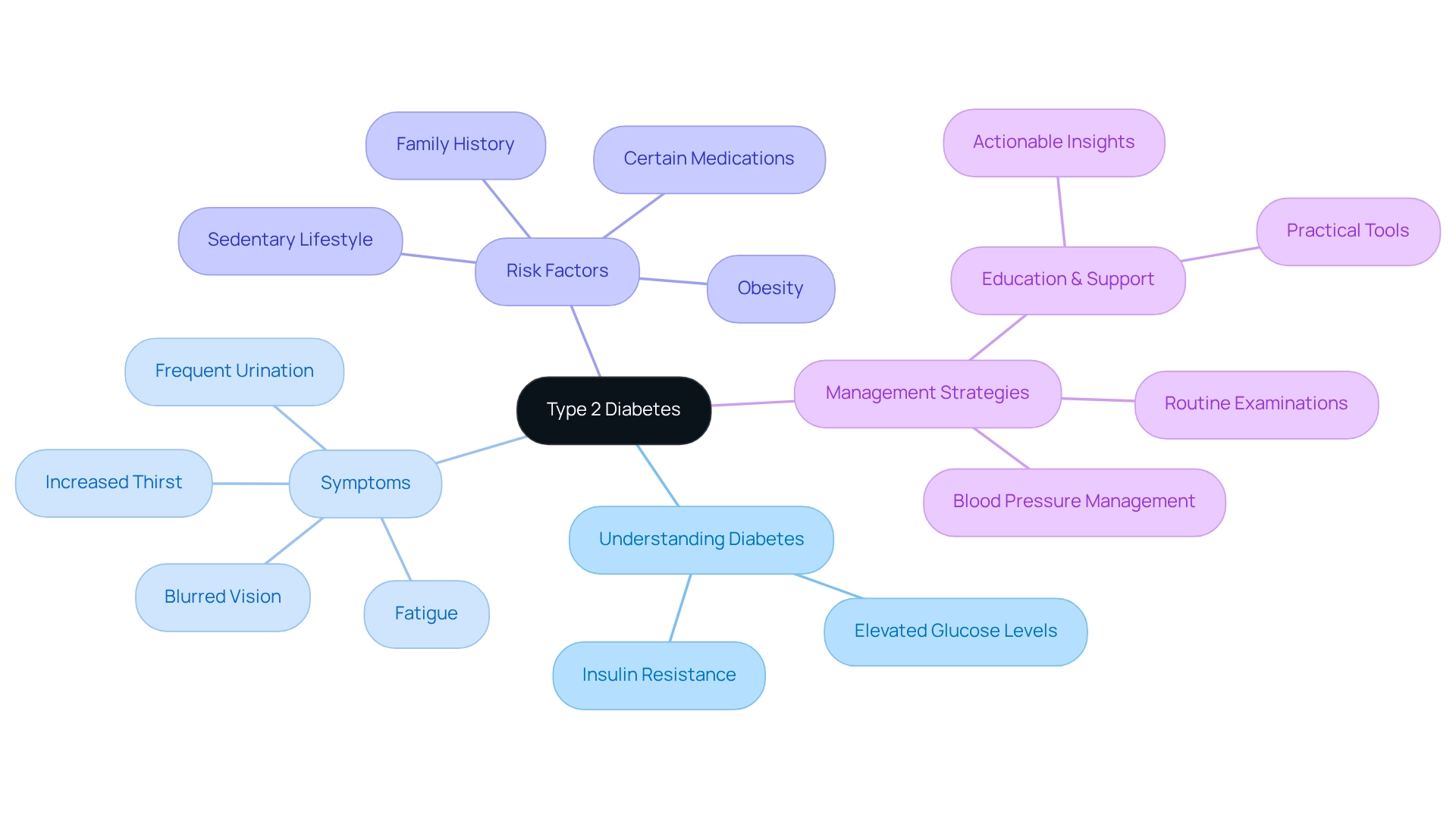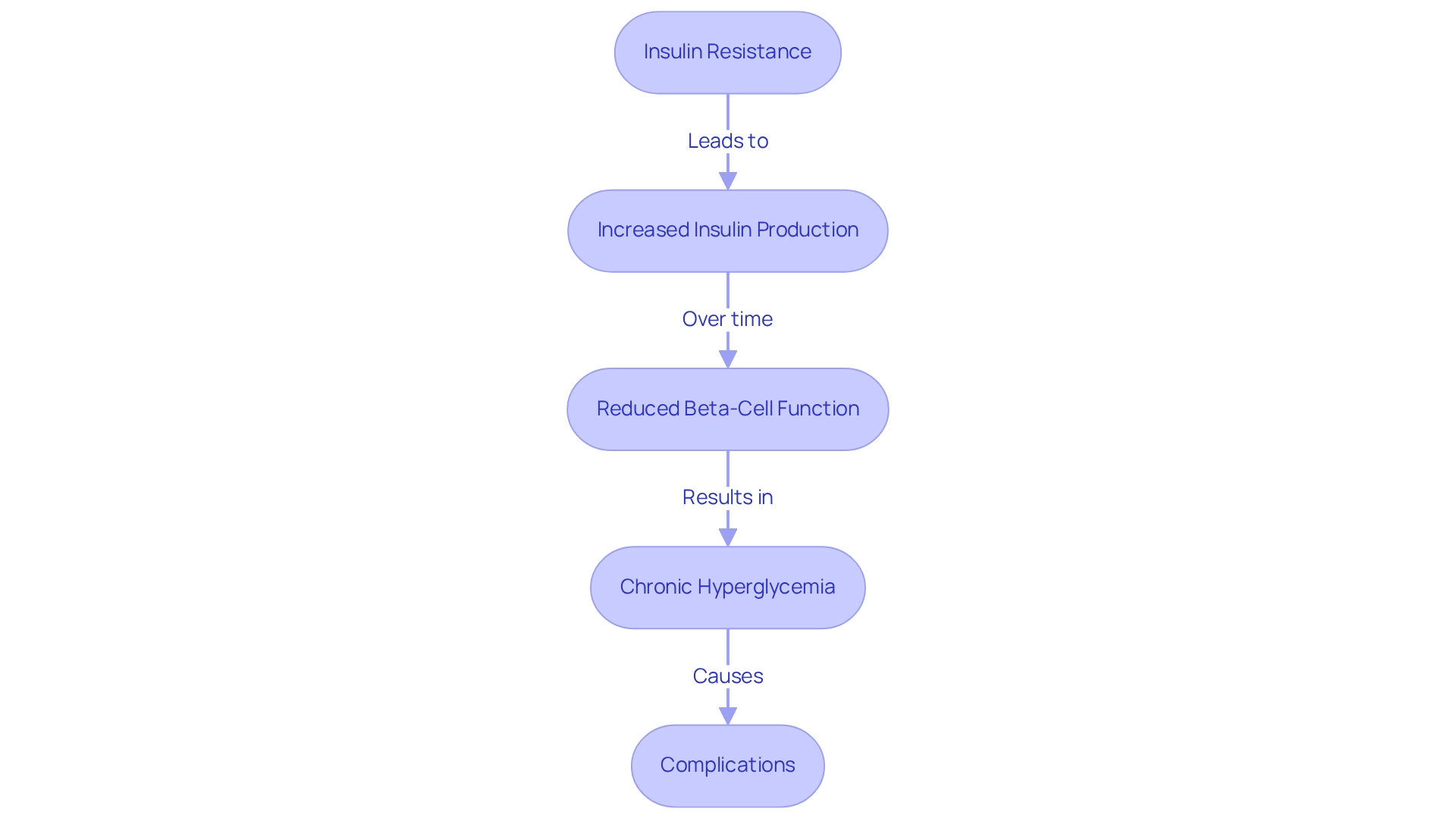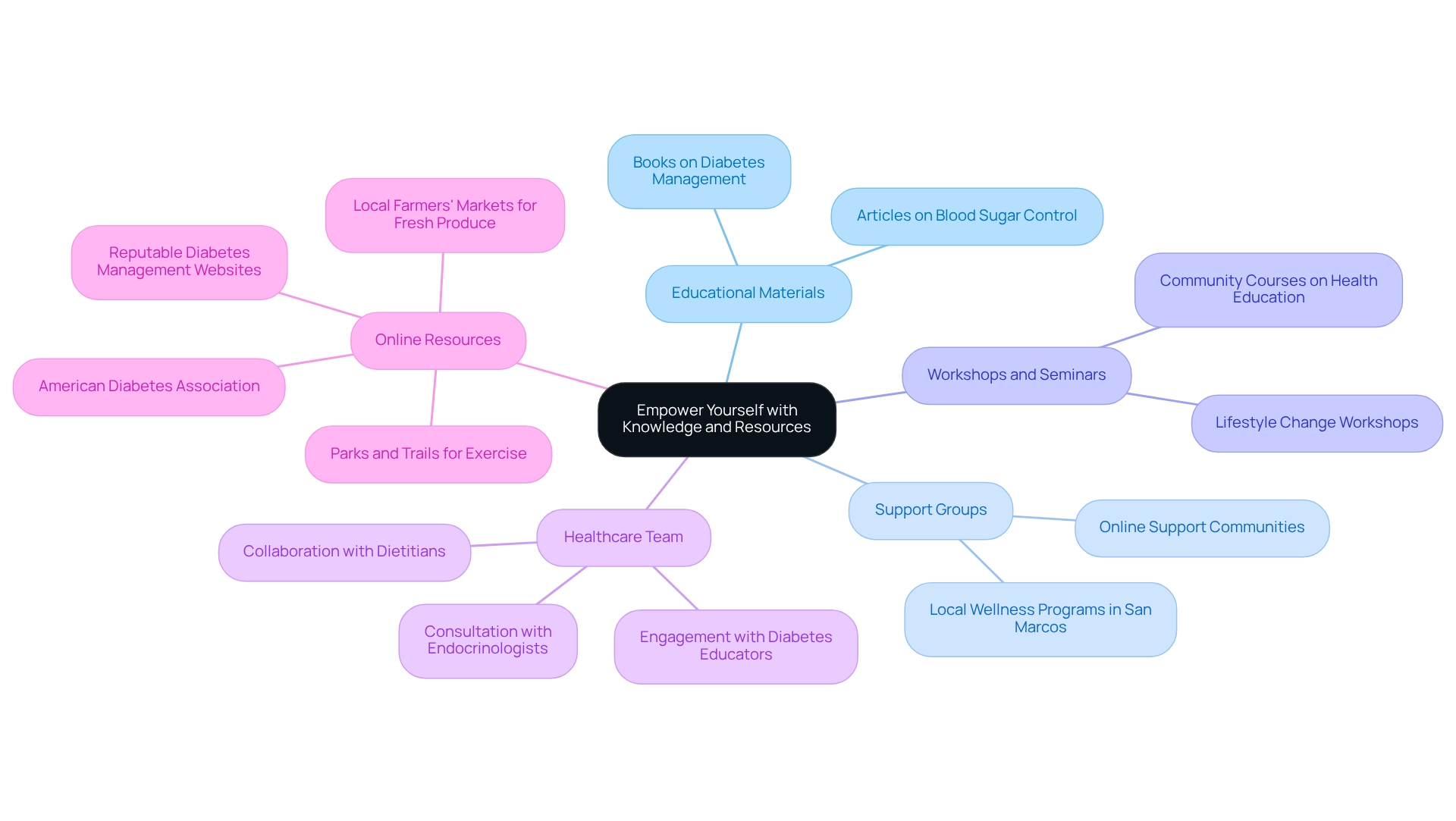Overview
Living with type 2 diabetes can be challenging, especially when it comes to understanding insulin resistance. This condition occurs when the body’s cells struggle to respond effectively to insulin, resulting in elevated blood glucose levels. It’s important to recognize that many individuals face this battle, and understanding the mechanisms behind insulin resistance is a vital step toward better health.
Managing factors such as diet, exercise, and medication adherence can feel overwhelming, but these elements are crucial for effective management. Many patients find that small, consistent changes in their daily routines can lead to significant improvements in their health outcomes. Remember, you are not alone in this journey, and support is available.
By focusing on these key areas, you can take proactive steps toward a healthier lifestyle. Embracing a holistic approach to managing your diabetes can empower you to regain control and improve your well-being. Consider exploring programs like the 30-Day Diabetes Reset, which can provide guidance and support tailored to your needs. Together, we can work toward a brighter, healthier future.
Introduction
In the realm of chronic health conditions, type 2 diabetes stands out as a prevalent and complex issue affecting millions. It’s important to recognize that this condition, characterized by insulin resistance and a host of accompanying symptoms, poses significant challenges for those diagnosed.
With approximately 34.2 million Americans grappling with diabetes—90-95% of which are type 2 cases—understanding the underlying mechanisms, risk factors, and effective management strategies is crucial. Many patients find that navigating this journey can feel overwhelming, but there is hope.
As research continues to unveil the intricacies of this disease, individuals are empowered to reclaim their health through informed choices, personalized care, and community support. This article delves into the essentials of type 2 diabetes, offering insights into its management and the vital role education plays in navigating this chronic condition.
Understand the Basics of Type 2 Diabetes
To understand how diabetes type 2 works, it’s important to recognize that it is a chronic condition primarily driven by insulin resistance. This means that the body’s cells struggle to respond adequately to insulin, illustrating how diabetes type 2 works, which leads to elevated glucose levels. Many people living with this condition experience symptoms such as:
- Increased thirst
- Frequent urination
- Fatigue
- Blurred vision
It’s important to recognize how diabetes type 2 works, as approximately 34.2 million Americans, or 10.5% of the population, are affected, with Type 2 diabetes accounting for about 90-95% of these cases. As you navigate this journey, it’s crucial to be aware of how diabetes type 2 works and the major risk factors that can lead to its onset, including:
- Obesity
- A sedentary lifestyle
- A family history of the illness
Recent studies also suggest that certain medications may contribute to its development, highlighting the complexity of managing this condition. Many patients find that understanding these factors can empower them to take control of their health.
Comprehensive care is vital in managing symptoms effectively. For instance, maintaining blood pressure and cholesterol within recommended ranges is key to preventing long-term complications, especially those related to cardiovascular health. Routine examinations and assessments play an essential role in blood sugar control, ensuring that potential complications are identified and addressed promptly. Expert opinions emphasize that grasping how diabetes type 2 works, along with its signs and risk factors, is critical for effective management. As Dr. Jason Shumard notes, providing patients with actionable insights and practical tools fosters an environment where individuals can reclaim their health and well-being. By focusing on education and personalized care, you can better navigate your journey toward improved health outcomes. Remember, you are not alone in this; support and resources are available to guide you every step of the way.
Explore the Mechanisms of Type 2 Diabetes
Managing type 2 diabetes can be a challenging journey, especially when considering how diabetes type 2 works, which is primarily characterized by resistance to insulin and insufficient secretion from the pancreas. Initially, your pancreas may attempt to compensate for this resistance by increasing its insulin production. However, as the condition progresses, this compensatory mechanism often falls short, leading to chronic hyperglycemia. This persistent elevation in blood sugar levels can result in serious complications, including cardiovascular issues, neuropathy, and kidney damage.
It’s important to recognize that around 90% of individuals with type 2 diabetes experience some level of insulin resistance, which significantly impairs glucose absorption by the body’s cells. Recent research has uncovered various factors contributing to this resistance, such as inflammation, lipid buildup, and alterations in gut microbiota. These elements disrupt the normal signaling pathways of insulin, exacerbating the situation.
Many patients find that their pancreatic function is also affected as the disease progresses. A considerable number experience a decline in insulin secretion over time, which is crucial for maintaining glucose balance. In fact, studies reveal that approximately 50% of individuals with type 2 diabetes have reduced pancreatic beta-cell function, complicating their management further, highlighting the importance of understanding how diabetes type 2 works. Endocrinologists emphasize that understanding how diabetes type 2 works, particularly through addressing insulin resistance and improving pancreatic function, are key components of effective treatment strategies. By focusing on these underlying issues, healthcare providers can develop more targeted interventions that not only alleviate symptoms but also tackle the root causes of diabetes.
Real-life experiences illustrate the impact of chronic hyperglycemia. Patients frequently report complications such as vision problems, neuropathy, and cardiovascular concerns, highlighting the urgent need for effective management strategies. Dr. Jason Shumard’s functional medicine approach embodies this shift, empowering patients through education and personalized care. At the Integrative Wellness Center, individuals are encouraged to connect with community resources and participate in events that offer valuable insights into managing their condition.
If you’re looking to restore your health and regain control of your life, call 858-564-7081 to learn how Dr. Shumard can assist you. This comprehensive approach not only leads to improved health outcomes but also fosters a better quality of life for those affected by type 2 diabetes.
Implement Effective Management Strategies for Type 2 Diabetes
Managing type 2 conditions can feel overwhelming, but understanding how diabetes type 2 works and employing effective strategies can make a significant difference in your journey toward better health.
Dietary Changes: Embracing a balanced diet rich in whole foods—think colorful vegetables, lean proteins, and whole grains—can be a game changer. It’s essential to monitor your carbohydrate intake, as this plays a crucial role in maintaining stable blood sugar levels. Many patients have shared their success stories, noting how dietary modifications have led to improved control over their condition.
Regular Exercise: Have you considered incorporating at least 150 minutes of moderate aerobic activity into your week? Activities like brisk walking or cycling can enhance your insulin sensitivity and overall metabolic health. Interestingly, individuals who engage in exercise for disease prevention often report better psychological outcomes than those managing existing conditions.
Weight Management: Even a modest weight loss of 5-10% can lead to significant improvements in blood sugar control. This is especially important given the rising healthcare costs associated with type 2 diabetes, which highlights the need for effective management strategies to understand how diabetes type 2 works.
Medication Adherence: If you’ve been prescribed medication, taking it as directed is vital for regulating blood sugar levels. Sticking to your medication regimen can profoundly impact your overall health outcomes.
Regular Monitoring: Consistently tracking your blood sugar levels can help you understand how different foods and activities affect your condition. This proactive approach is essential for making informed dietary and lifestyle decisions.
By integrating these strategies into your daily routine, you can take meaningful steps toward managing your type 2 condition effectively. Remember, these actions can lead to better health outcomes and an improved quality of life. You are not alone on this journey; many have walked this path and found success.
Empower Yourself with Knowledge and Resources
Empower yourself by utilizing available resources:
- Educational Materials: Have you considered engaging with books and articles focused on managing your condition? Thorough education on blood sugar management can significantly enhance your understanding of how diabetes type 2 works, leading to better health outcomes and helping to reduce complications.
- Support Groups: Connecting with local or online support groups can be incredibly beneficial. Sharing experiences with others facing similar challenges fosters emotional support and a sense of belonging, both of which are vital for effective health management. In San Marcos, engaging with community wellness programs can provide tailored support and resources, enhancing your ability to manage your condition effectively.
- Workshops and Seminars: Attending educational events allows you to learn from experts and exchange experiences with peers. Many patients find that workshops focusing on lifestyle changes lead to encouraging outcomes. Long-term research suggests that such programs can prevent or postpone the onset of conditions, which raises the question of how diabetes type 2 works. In San Marcos, consider joining community courses that emphasize health education, nutrition, and fitness.
- Healthcare Team: It’s important to work together with healthcare experts, including Dr. Jason Shumard, to create a customized plan for controlling your blood sugar levels. A unified strategy involving dietitians, endocrinologists, and educators can lead to more effective management techniques. Understanding how diabetes type 2 works, including the risks associated with conventional treatments like increased insulin levels and the potential for insulin resistance, is crucial for making informed decisions about your care.
- Online Resources: Leverage reputable websites and organizations, like the American Diabetes Association, for the latest information and tools. These resources offer valuable insights into diabetes management, including dietary recommendations and technological advancements in care delivery. Additionally, exploring local farmers’ markets in San Marcos for fresh produce can support a diabetes-friendly diet. Don’t forget to take advantage of the area’s beautiful parks and trails for regular exercise, as they can greatly enhance your overall well-being.
Conclusion
Type 2 diabetes poses a significant health challenge for millions, but it’s important to recognize that understanding its complexities can empower you to take control of your health. By grasping the basics of the condition—its symptoms, risk factors, and underlying mechanisms—you can better navigate your diabetes journey. Many patients find that effective management strategies, including dietary changes, regular exercise, and medication adherence, are crucial for maintaining stable blood sugar levels and preventing complications.
Moreover, the importance of education and community support cannot be overstated. Engaging with educational resources, support groups, and healthcare professionals fosters a comprehensive approach to diabetes management. This collaborative effort not only enhances individual knowledge but also cultivates a supportive environment that encourages shared experiences and emotional resilience.
Ultimately, those affected by type 2 diabetes can reclaim their health through informed choices and proactive management. By prioritizing education, personalized care, and community engagement, you can significantly improve your health outcomes and quality of life. The path may be challenging, but with the right tools and support, it is possible to thrive despite the complexities of type 2 diabetes.
Frequently Asked Questions
What is diabetes type 2 and how does it work?
Diabetes type 2 is a chronic condition primarily driven by insulin resistance, where the body’s cells struggle to respond adequately to insulin, leading to elevated glucose levels.
What are the common symptoms of diabetes type 2?
Common symptoms include increased thirst, frequent urination, fatigue, and blurred vision.
How many people are affected by diabetes type 2 in the United States?
Approximately 34.2 million Americans, or 10.5% of the population, are affected by diabetes, with type 2 diabetes accounting for about 90-95% of these cases.
What are the major risk factors for developing diabetes type 2?
Major risk factors include obesity, a sedentary lifestyle, and a family history of the illness. Certain medications may also contribute to its development.
Why is comprehensive care important for managing diabetes type 2?
Comprehensive care is vital for managing symptoms effectively, maintaining blood pressure and cholesterol within recommended ranges, and preventing long-term complications, especially those related to cardiovascular health.
How can patients take control of their health in managing diabetes type 2?
Understanding the signs, risk factors, and management strategies can empower patients. Education and personalized care are crucial in navigating their health journey.
What role do routine examinations play in managing diabetes type 2?
Routine examinations and assessments are essential for blood sugar control, ensuring that potential complications are identified and addressed promptly.



